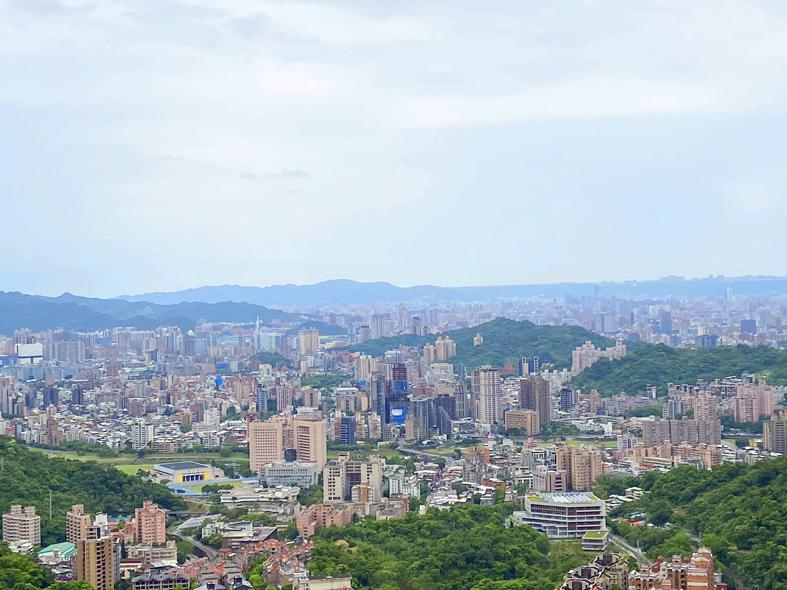The number of presale and new housing units on the market declined last quarter from the previous quarter, but selling prices continued to climb, defying policy measures to reverse the trend, a survey by Cathay Real Estate Development Co (國泰建設) showed yesterday.
The number of presale and new housing projects fell 22 percent from the fourth quarter of last year to 230 projects, while the overall number of housing units on the market fell 7.6 percent to 21,812, the quarterly survey showed.
The Taipei-based developer attributed the retreat to tightening measures by government agencies to rein in the property market.

Photo: Hsu Yi-ping, Taipei Times
The central bank cut its loan-to-value ratios twice in the first quarter to 40 percent for corporate buyers and people who own four homes to make the market less attractive for speculative buyers, while the Ministry of Finance raised capital gains taxes to between 35 and 45 percent on properties resold within five years of purchase.
The finance ministry is also to levy punitive taxes on contract transfers for presale projects from July 1.
The housing market appeared to have cooled down in Taoyuan, Hsinchu City, Taichung, Tainan and Kaohsiung, judging by the supply, Cathay Real Estate said.
However, selling prices picked up as developers sought to pass rising raw material and labor costs to buyers, the analyst said, adding that it is too early to assess the impact of policies.
Housing prices averaged NT$308,100 per ping (3.3m2) nationwide, gaining 2.01 percent from three months earlier, while 30-day sales rates shed 2.41 percentage points to 11.71 percent, it said. Meanwhile, the room for price concessions widened by 0.79 percentage points to 13.45 percent, it added.
That meant the supply side grew more flexible in pricing to facilitate transactions, as lawmakers consider imposing hoarding taxes on multiple-home owners and the Ministry of the Interior plans revisions to public space requirement in residential complexes.
Taichung reported the steepest price hike of 3.62 percent to NT$266,400 per ping last quarter, as the city benefitted from the inauguration of its mass rapid transit system, the survey showed.
Hsinchu posted the second-steepest raise of 3.29 percent to NT$257,200 per ping, it showed
Prices in Taipei increased 2.78 percent to NT$889,800 per ping and those in New Taipei City advanced 0.51 percent to NT$402,400 per ping, while prices gained 0.68 percent to NT$269,000 per ping in Taoyuan, the survey showed.
Prices in Tainan rose 0.55 percent to NT$236,600 per ping, while prices in Kaohsiung increased 0.46 percent to NT$240,700 per ping, it showed.

SEMICONDUCTORS: The German laser and plasma generator company will expand its local services as its specialized offerings support Taiwan’s semiconductor industries Trumpf SE + Co KG, a global leader in supplying laser technology and plasma generators used in chip production, is expanding its investments in Taiwan in an effort to deeply integrate into the global semiconductor supply chain in the pursuit of growth. The company, headquartered in Ditzingen, Germany, has invested significantly in a newly inaugurated regional technical center for plasma generators in Taoyuan, its latest expansion in Taiwan after being engaged in various industries for more than 25 years. The center, the first of its kind Trumpf built outside Germany, aims to serve customers from Taiwan, Japan, Southeast Asia and South Korea,

Gasoline and diesel prices at domestic fuel stations are to fall NT$0.2 per liter this week, down for a second consecutive week, CPC Corp, Taiwan (台灣中油) and Formosa Petrochemical Corp (台塑石化) announced yesterday. Effective today, gasoline prices at CPC and Formosa stations are to drop to NT$26.4, NT$27.9 and NT$29.9 per liter for 92, 95 and 98-octane unleaded gasoline respectively, the companies said in separate statements. The price of premium diesel is to fall to NT$24.8 per liter at CPC stations and NT$24.6 at Formosa pumps, they said. The price adjustments came even as international crude oil prices rose last week, as traders

SIZE MATTERS: TSMC started phasing out 8-inch wafer production last year, while Samsung is more aggressively retiring 8-inch capacity, TrendForce said Chipmakers are expected to raise prices of 8-inch wafers by up to 20 percent this year on concern over supply constraints as major contract chipmakers Taiwan Semiconductor Manufacturing Co (TSMC, 台積電) and Samsung Electronics Co gradually retire less advanced wafer capacity, TrendForce Corp (集邦科技) said yesterday. It is the first significant across-the-board price hike since a global semiconductor correction in 2023, the Taipei-based market researcher said in a report. Global 8-inch wafer capacity slid 0.3 percent year-on-year last year, although 8-inch wafer prices still hovered at relatively stable levels throughout the year, TrendForce said. The downward trend is expected to continue this year,

Taiwan Semiconductor Manufacturing Co (TSMC, 台積電), which supplies advanced chips to Nvidia Corp and Apple Inc, yesterday reported NT$1.046 trillion (US$33.1 billion) in revenue for last quarter, driven by constantly strong demand for artificial intelligence (AI) chips, falling in the upper end of its forecast. Based on TSMC’s financial guidance, revenue would expand about 22 percent sequentially to the range from US$32.2 billion to US$33.4 billion during the final quarter of 2024, it told investors in October last year. Last year in total, revenue jumped 31.61 percent to NT$3.81 trillion, compared with NT$2.89 trillion generated in the year before, according to